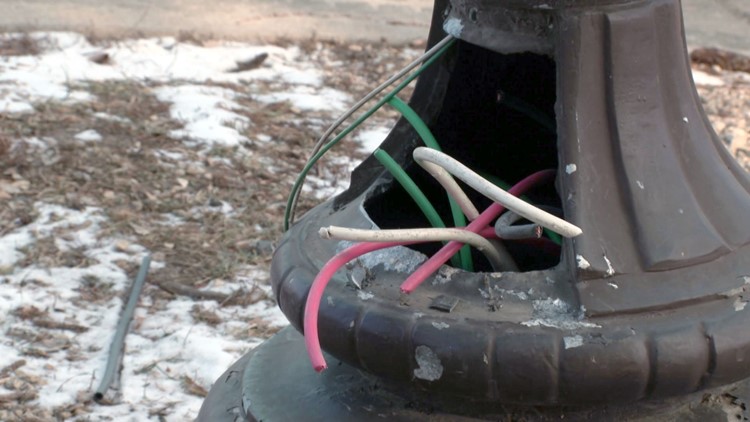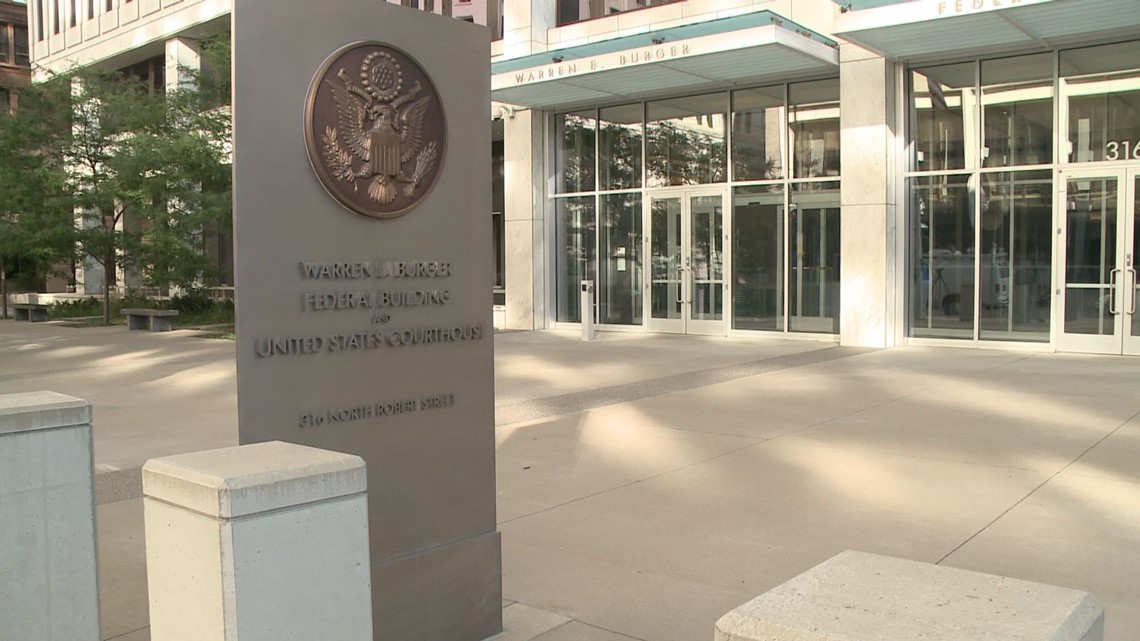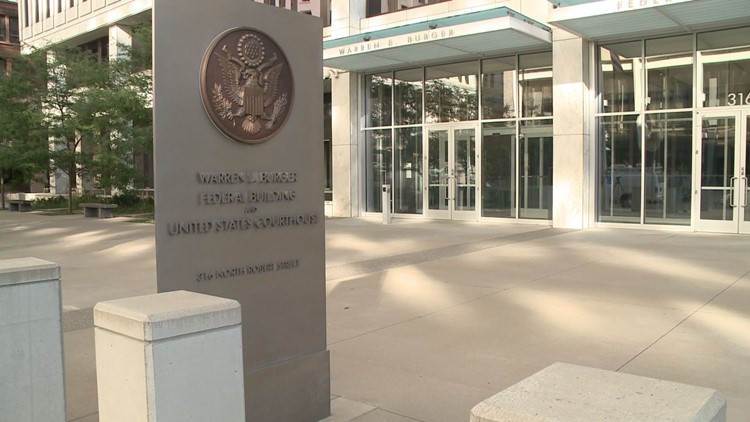Kare11
Copper wire stolen from Roseville light poles


ROSEVILLE, Minn. — Over the weekend, more than 18,000 feet of copper wire were stolen from dozens of outdoor light poles in Roseville’s Central Park.
The City of Roseville said in a news release that copper wiring was stripped from 27 light poles between Lexington Avenue and Victoria Street on Saturday and could cost more than $70,000 to repair.
“This is particularly disheartening because so many residents rely on Central Park for physical activity and mental rejuvenation, especially during the fall and winter when the days are short,” said Roseville Parks and Recreation Director Matthew Johnson in a release. “We will do everything in our power to get this repaired as quickly and efficiently as possible, but it will be a significant undertaking.”
Copper wire thefts have been on the rise over the past few years, and have cost taxpayers millions to repair. St. Paul Rep. Athena Hollins and Sen. Sandy Pappas introduced a new bill in April to require Minnesotans to get a state license to buy and sell scrap copper wiring. The bill passed and will go into effect Jan. 1, 2025.
“People are stealing copper because a small number of businesses are looking the other way and not asking questions when they buy stolen copper,” Rep. Hollins told reporters back in April.
Sen. Pappas said the goal of the bill is to remove the marketplace for stolen copper wiring, adding that licensed electrical contractors would be automatically licensed to sell scrap copper wiring, and do-it-yourselfers would be allowed to donate leftover copper to recyclers.
“Residents and businesses would still be allowed to recycle copper with scrap metal companies for free, and the thieves who’ve been gutting our public utilities will be locked out of the market where they earn most of their money,” said Pappas.
Kare11
Eden Prairie man sentenced for COVID relief fraud


The 75-year-old is accused of spending the Paycheck Protection Program money on himself.
ST PAUL, Minn — An Eden Prairie man was sentenced to seven years behind bars for Covid relief fraud, with officials saying he applied for more than $2.1 million in funds which he spent on himself.
U.S. Attorney Andrew M. Luger announced in a press release Harold Bennie Kaeding, 75, of Eden Prairie was sentenced to more than seven years in federal prison. He was convicted of wire fraud, aggravated identity theft, and money laundering.
In the first three months of the Covid-19 pandemic, Luger said Kaeding used the name of close family members to submit loan applications for different corporate entities, that were either defunct or not in existence when the pandemic began.
Kaeding was accused of fabricating tax documents, manufacturing bank statements, and submitting records to ensure the applications appeared legitimate. He initially received $1,642,670, Luger said, but banks realized the irregularities and were able to get some of the money back.
“Among other things, Kaeding used the money to get his personal residence out of impending foreclosure, purchase an SUV, and stockpile more than $80,000 in cash,” Luger said.
Kaeding was arrested in Columbia, where officials say he fled to when he learned he was under investigation. He was found guilty at a jury trial in August.
Kare11
Report: Fewer nursing home beds in rural MN


The Center for Rural Policy and Development published a new report that found rural Minnesota counties have 41% fewer nursing facility beds compared to 2005.
MINNEAPOLIS — The healthcare crisis across rural America just keeps growing.
A new report from the Center for Rural Policy and Development out of Minnesota shows that demand for long-term care for the elderly will skyrocket over the next 20 years.
Experts say the biggest hurdle will be to try and staff for that increase.
The University of Minnesota’s Rural Physician Associate Program is matching about 35 of its medical students a year to more rural areas where they learn a broader skillset and become well-known in the community.
“If we can get students to experience that in our program, they’re three times more likely to practice in a rural spot,” said U of M Professor Dr. Kirby Clark. “We don’t focus just on physicians because by themselves, without a team, is pretty worthless, so we promote all the other health professions that a community needs.”
The need extends beyond doctors and includes recruiting pharmacy techs and nurses, particularly at nursing homes, and the problems have forced many to shut their doors.
In Minnesota, eight nursing homes closed in 2023. In the three years before that, there were another 15, including one Jenny Gleason oversees.
“It was excruciating,” said Gleason, who’s the CEO of Living Services Foundation which has several facilities in southwest Minnesota. “People were just heartbroken because it becomes their community.”
Gleason converted that one closed facility to assisted living in 2021, citing staffing shortages.
“When we are constantly searching and calling everyone to see if you can work overtime, can you do this, like everyone is stressed,” said Gleason. “And it’s not that people don’t want to do a good job or be there, but they need balance too.”
The new report says demand for nursing beds won’t peak for at least another 20 to 30 years when its data shows more than 37,000 people will need one.
It also shows patients are sicker, reimbursement rates are low and some wages are higher.
Some of those wages will go up even more as the state’s newly formed workforce standards board voted to start raising minimum pay and benefits in 2026.
“Figuring out how to get the cash upfront to fund that is really, really challenging, especially after going through COVID-19 when organizations like mine put every extra penny we had into just making it through,” said Gleason.
The most severe declines are happening in Red Lake County, which lost all of its beds. Cass Lake County only has 33 beds left, followed by Grant and Swift Counties.
The report says Chippewa County is the only one to have more beds because the Department of Veterans Affairs built a new facility just this year.
In the meantime, other locations have to keep getting creative with recruitment and some say they’ll push for fewer barriers, including the new, federal minimum staffing requirements.
Kare11
Incoming City of Orono leadership looks to mend ties with City of Long Lake


A rift between the communities began years ago when the City of Orono decided to create their own fire department.
ORONO, Minn. — Orono is on track to replace four of their current five leaders next year, including their mayor. Challenger Bob Tunheim beat incumbent Denny Walsh with two-thirds of the votes this election. Tunheim has a background as an attorney and previously served as a school board chair during the pandemic.
His top priorities? Rebuilding trust with residents and mending the relationship with neighboring city Long Lake.
“I am eager to begin rebuilding trust and am confident that we can find a practical solution that benefits all parties while fully addressing Orono’s public safety needs,” Tunheim said.
Two new city council members were elected in Orono, too. Just last week, one city council member that wasn’t up for re-election resigned.
“I think people are interested in being sleepy little Orono in the western suburbs again,” councilmember elect Steve Persian jokingly said.
Persian, who was once a fire chief of Long Lake, feels the residents have spoken and it’s time to move forward with more civility in the city. One of his goals is to re-unite the Orono Fire Department with Long Lake. Something the previous administration was against.
In 2021, Orono Mayor Denny Walsh began taking steps to sever ties with Long Lake and build their own fire department. The two cities have shared a fire department together for 100 years. Walsh said at the time, Orono owned 85% of the service area and owned the majority of the equipment which led to them wanting to have control over their own department.
The division not only was highly scrutinized by residents but led to a lawsuit filed by Long Lake.
“We had to get an injunction, the City of Orono was held in contempt, twice. It’s been a lot of stress on our fire fighters most importantly,” Long Lake Mayor Charlie Miner.
Miner says the current fire contract between the cities expires in 2025. He says the city of Long Lake is delaying their trial date with hopes the cities can reach an amicable agreement.



